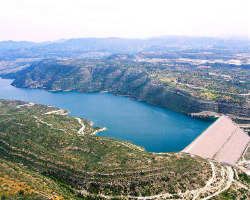Intersectoral, multifaceted plan to address climate change and water scarcity in Cyprus

Water Development Department
The effects of climate change in small countries call for an urgent improvement in their capacity to adapt and respond. Cyprus is addressing these challenges through a multifaceted plan and intersectoral interventions aimed at ensuring the availability and sustainable management of water and sanitation for the whole population.
The country island of Cyprus is located in one of the most sensitive and vulnerable hot spots in the world with regard to climate change, the Eastern Mediterranean. Water scarcity imposes major constraints on the economic welfare and the sustainable development of the island.
To address these challenges, the Government of Cyprus has introduced policy on the sustainable development and management of the country’s water resources, based on an intersectoral, multifaceted plan.
(a) Alignment of national legislation with the international framework
- Ratifying the “Paris Agreement” in January 2017, Cyprus is developing its economy in a way that reduces greenhouse gas emissions, while taking appropriate measures and actions to adapt to climate change.
- Cyprus, being an EU country, has transposed the European Union Water Framework Directive and other related European Directives into the national legislation, providing the necessary legal framework to ensure the sustainable and integrated management of water resources on the island.
(b) Introduction of short-term measures to combat drought spells using existing infrastructures and management policies.
- These measures include developing a quota system by priority, using downstream dam recharge, maintaining a water reserve for future needs, improving irrigation systems, conducting water-saving campaigns, and establishing programmes to reduce distribution loss.
(c) Enhancement of long-term action to improve system reliability and meet future demands
- Institutional restructuring, implementation of storage and recharge works, use of nonconventional water resources (desalination of domestic water, treatment of wastewater for reuse in irrigation), introduction of pricing policies and raising public awareness are some of the measures taken.
(d) Promotion of collaborative networks
- Collaboration with other Mediterranean countries on water- and sanitation-related activities is being promoted through bilateral assistance programmes and regional initiatives.
All small countries experience the effects of climate change, including those on water resources. As affirmed in the “Iceland Statement. Ensuring safe and climate-resilient water and sanitation (2018)”, which was endorsed by all participants in the WHO Small Countries Initiative during the Fifth high-level meeting of Small Countries: working together for better health and well-being for all (Rejkyavik, Iceland, June 2018), concerted action across sectors is of fundamental importance in decreasing the burden of disease linked to environmental factors and protecting health from the effects of climate change.
Cyprus will continue to work towards achieving United Nations Sustainable Development Goal 6 – “ensure availability and sustainable management of water and sanitation for all” – and implementing related European and national water policies.



